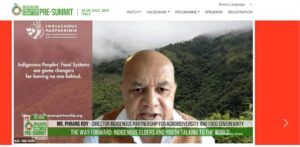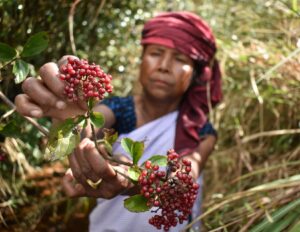The Pre-Summit of the UN Food Systems Summit will set the stage for the culminating global event in September by bringing together diverse actors from around the world to leverage the power of food systems to deliver progress on all 17 Sustainable Development Goals (SDGs). In partnership with the Government of Italy, the Pre-Summit took place in Rome from July 26 to 28, 2021. Through the Pre-Summit, the UN Food Systems Summit will reaffirm its commitment to promote human rights for all and ensure the most marginalised groups have an opportunity to participate in, contribute to and benefit from the Summit process.
Under the leadership of the UN Secretary-General António Guterres, the Pre-Summit is a “People’s Summit” that will bring together youth, farmers, indigenous peoples, civil society, researchers, private sector, policy leaders and ministers of agriculture, environment, health, nutrition and finance, among other participants. The event aims to deliver the latest evidence-based and scientific approaches to food systems transformation from around the world, launch a set of new commitments through coalitions of action and mobilize new financing and partnerships. All of this will be achieved by fostering diverse engagement from all quarters to uncover the broadest range of solutions and have maximum impact, together.
Since last year, the Summit has hosted regular online meetings, public forums and surveys organized around the Summit’s five action tracks to ensure the broadest possible range of perspectives and ideas to develop food systems that cater to all. The Summit will consolidate all that it has heard and the Member States and actors around the world will begin to focus on how to operationalize the best ideas and commitments, to be announced in June, to close gaps and raise ambition towards achieving the SDGs by 2030.
The Pre-Summit will take stock of the progress made through that process, laying the groundwork for an ambitious and productive UN Food Systems Summit, which will take place in September alongside the UN General Assembly in New York (Source: United Nations website – https://www.un.org/en/food-systems-summit/pre-summit).

In the above-mentioned Pre-Summit held from July 26 to 28, 2021, Mr. Phrang Roy, Founding Chairperson of NESFAS represents the voice of Indigenous Peoples at the UN Food Systems Pre-Summit event to defend and promote the strengths of diverse local food systems. Mr. Phrang Roy spoke in four different sessions at the Pre-Summit shedding light on which the Indigenous Peoples Food and Knowledge Systems continue to be marginalised in policy makings despite visible benefits and results. With the stern belief that the Indigenous Food Systems are the game-changers the UN is looking for in the upcoming Food Summit, Mr. Phrang called on the UN to acknowledge the same. In the first session titled “Ensuring No One is Left Behind: Equitable Livelihoods in Food Systems”, Mr. Roy was quoted saying, “Indigenous people have been shouting from the hilltops that our indigenous food systems are game-changers and they need acknowledgement and specific support. Unfortunately, no one has seriously listened to us so far”.
As part of the Decade of Action to achieve Sustainable Development Goals by 2030, the UN Secretary-General António Guterres has convened a Food Systems Summit scheduled for September this year. With one eye on delivering progress on all 17 SDGs and the other on “building back better” from COVID-19, the Summit is set to launch bold new actions, each of which relies to some degree on healthier, more sustainable and equitable food systems.
As a preparatory meeting for the Summit, the UN organised the Pre-Summit of the UN Food System Summit. This year’s UN Food System Summit is also the first-ever summit that recognises the contribution and voices of Indigenous Peoples in the Global food systems Summit. Currently, in the Pre-Summit being held virtually at Rome, Mr. Phrang Roy acted as one of the main representatives for Indigenous Peoples worldwide, defending and promoting Indigenous Food Systems. He cited an example of how a recent study on 18 villages in the North East of India showed a virtually non-existent severe food insecurity among the villages. This was proof of how the food systems and knowledge of Indigenous Peoples often left no one behind. Speaking of Indigenous Peoples and the need to protect their lands, Mr. Roy reiterated that while Indigenous Peoples are not vulnerable, they are often put in a position of vulnerability in many countries worldwide. Often, this exploitation of the Rights of Indigenous Peoples is due to the absence of proper laws that protect their lands. For this to change, he advocated an intercultural approach in education in schools and universities.
One of the main pioneers in bringing the movement of Indigenous Peoples to the UN, Mr. Roy is highly revered among the panellists and the Indigenous Peoples community alike. In all the sessions, he was addressed with the Khasi prefix “Bah” instead of Mr. or Dr. acknowledging the indigenous way of referring to people which has been achieved through his constant effort. Mr. Roy also made a rallying call to confront the global food industry that remains the major contributor to the current social, environmental, and economic crises that are affecting the entire planet. Unlike Indigenous Peoples’ food systems that leave no one behind, the global food industry, although considered one of the biggest employers in the world, is also an industry that leaves so many behind. As such, he spoke sternly against large agri-based business projects and urges for proactive resistance against such undertakings.
On the other hand, Mr. Roy believes Shifting Cultivation, mobile fishing and hunting, and transhumance are all essential for biodiversity conservation and Indigenous Food Systems. He also brought up the White Wiphala Paper developed by The Global Hub on Indigenous Peoples Food Systems as a contribution to the UN Food System Summit. The paper emphasizes the recognition of Indigenous Peoples’ land and territories and their effective landscape management practices. It supports bio-centric restoration, scale-out agroecology production systems and a shift towards nature positive food production. As custodians and enhancers of 80% of biodiversity globally, Mr. Roy called on the UN many times in his sessions to categorically acknowledge the food system of the 470 million Indigenous Peoples worldwide.
Mr. Roy also requested the UN to set up an autonomously managed Indigenous Peoples Trust Funds to revitalise Indigenous Peoples’ Food Systems. He voiced his strong support for women empowerment citing examples of how matriarchal indigenous communities are socially egalitarian, economically balanced, and politically based on consensus building. “They (women) can be our beacons of hope to build back better with women’s agency, voice and leadership,” he added.
Within its broader goal of accelerating food systems transformation, the Pre-Summit aims to
- Bring together the best ideas from all of the Summit’s structures while also identifying priorities and distilling a common vision that will lie at the heart of the UN Secretary-General’s statement of action at the Summit.
- Serve as a pledging moment for governments, businesses, civil society and other players to announce new commitments to support food systems transformation and advance game-changing solutions through multi-stakeholder collaboration.
- Provide Heads of State and other public and private leaders an opportunity to feature and advance their commitments to action, set a tone of leadership and bold ambition, and inspire the engagement of many others ahead of the Summit. 4 Promote a global discourse and narrative that puts food systems at the centre of global efforts to achieve the SDGs, with vast virtual engagement and a coordinated advocacy and communications campaign in all regions of the world. This discourse will highlight the importance of food systems for progress on climate, development finance, health, human rights and other global priorities.
- Foster a sense of community by bringing together countries, stakeholders, and constituencies in all parts of food systems from all parts of the world and lastly 5. Mobilize public and private investments to drive food systems transformation and prioritize game-changing solutions (Source: United Nations website – https://www.un.org/en/food-systems-summit/pre-summit).
This article is originally published in The Meghalaya Times
(The writer can be reached at maxwell.lyngdoh@gmail.com)





